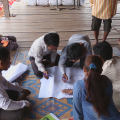Research 4 All podcast: Dealing with various aspects of water insecurity in research in the Mekong Region
The second episode of our "Research 4 All" podcast series discusses why SUMERNET focuses on water "insecurity” rather than water security, and the challenges for researchers studying different aspects of water insecurity such as access, rights, gender, conflicts over water infrastructure as well as water politics at larger scales.
Episode 02 host: Leonie Pearson
Sound editing: Rajesh Daniel
Artwork: Kadesiree Thossaphonpaisan; Cover photo by Diego Gennaro on Unsplash
Series producers: Rajesh Daniel and Leonie Pearson
Reducing water insecurity in the Mekong Region is SUMERNET’s focus on the ongoing phase – SUMERNET For All. But why should we talk about water insecurity rather than water security?
This podcast hosts Dr. Louis Lebel from Chiang Mai University, who is the SUMERNET Advisor on Water Insecurity.
In this episode, Dr. Louis Lebel talks about how “water insecurity” can be a challenge to researchers who need to go out of their comfort zones and study issues that are often overlooked such as access, rights, gender, conflicts over water infrastructure as well as water politics at the larger scale.
SUMERNET podcasts highlight different aspects of our work on research, policy engagement, capacity building and communications in the Mekong Region.
Visit our website www.sumernet.org to find out more about our work to improve policies and practices in reducing water insecurity in the Mekong Region.
Info
This story is part of the following project
SUMERNET 4 All: Engaging with water insecurity in the Mekong Region
Related people
You might be interested in
-
SUMERNET Vision Guide introducing the new phase "SUMERNET 4 All"
The new, revised "Vision Guide" for SUMERNET is now available. This vision guide presents an overview of SUMERNET - its origins and governance structure, background to the network, aims, key research areas, engagement with policy, and outreach products
![SUMERNET Vision Guide introducing the new phase "SUMERNET 4 All"]()
-
SUMERNET 4 All Call for Proposals on Joint Action
SUMERNET 4 All (S4A) provides financial support and technical assistance to consortia of researchers and boundary partners from the Mekong Region
![SUMERNET 4 All Call for Proposals on Joint Action]()
-
SUMERNET launches redesigned website to provide a fresh visual look and direction
SUMERNET is proud to announce the launch of our redesigned website to coincide with our new phase of work on addressing water insecurity in the Mekong Region.
![SUMERNET launches redesigned website to provide a fresh visual look and direction]()






 Read more about SUMERNET
Read more about SUMERNET
